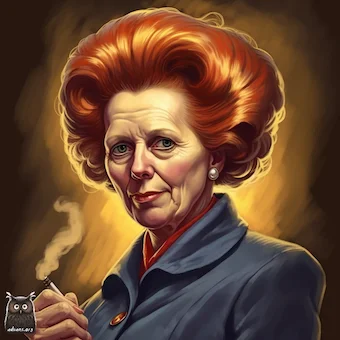On May 4th, 1979, Margaret Thatcher made history as she became the first female Prime Minister of the United Kingdom. Known for her steely determination and uncompromising leadership style, she quickly earned the nickname of the “Iron Lady”. But how did Thatcher rise to power, and what did she achieve during her time in office?
Born in Grantham, Lincolnshire in 1925, Thatcher was the daughter of a grocer and a local politician. She went on to study chemistry at Oxford University, where she became involved in student politics and developed her conservative views. After a stint in research, Thatcher trained as a barrister and was elected as a Member of Parliament (MP) for Finchley in 1959.
Thatcher quickly rose through the ranks of the Conservative Party, serving in a number of ministerial positions before becoming the party’s leader in 1975. Her leadership style was marked by a fierce commitment to free market principles, a disdain for trade unions, and a determination to reduce inflation and government spending.
Thatcher’s tenure as Prime Minister was marked by a number of controversial policies and events. She took on the trade unions, particularly the National Union of Mineworkers, in a series of bitter strikes that would define her time in office. She also implemented a series of economic reforms that aimed to reduce inflation and modernize the British economy, though they were not without their critics.
One of Thatcher’s most notable achievements was her role in increasing opportunities for women in the UK. She appointed a number of women to key ministerial positions, including the first female Foreign Secretary, and famously declared that “there is no such thing as society, only individuals and families”. This commitment to individualism and personal responsibility became a hallmark of Thatcher’s political philosophy.
Throughout her time in office, Thatcher was known for her distinctive style, which often included a handbag and a trademark hairstyle. She was also known for her forthright opinions and willingness to stand up to her political opponents, both at home and abroad.
Thatcher’s legacy remains a subject of debate to this day. While many credit her with modernising the British economy and bringing an end to the post-war consensus, others criticise her policies for exacerbating social inequality and dismantling key public services. But regardless of one’s views on her politics, there can be no doubt that Margaret Thatcher was a trailblazer who paved the way for future generations of female politicians in the UK and around the world.

